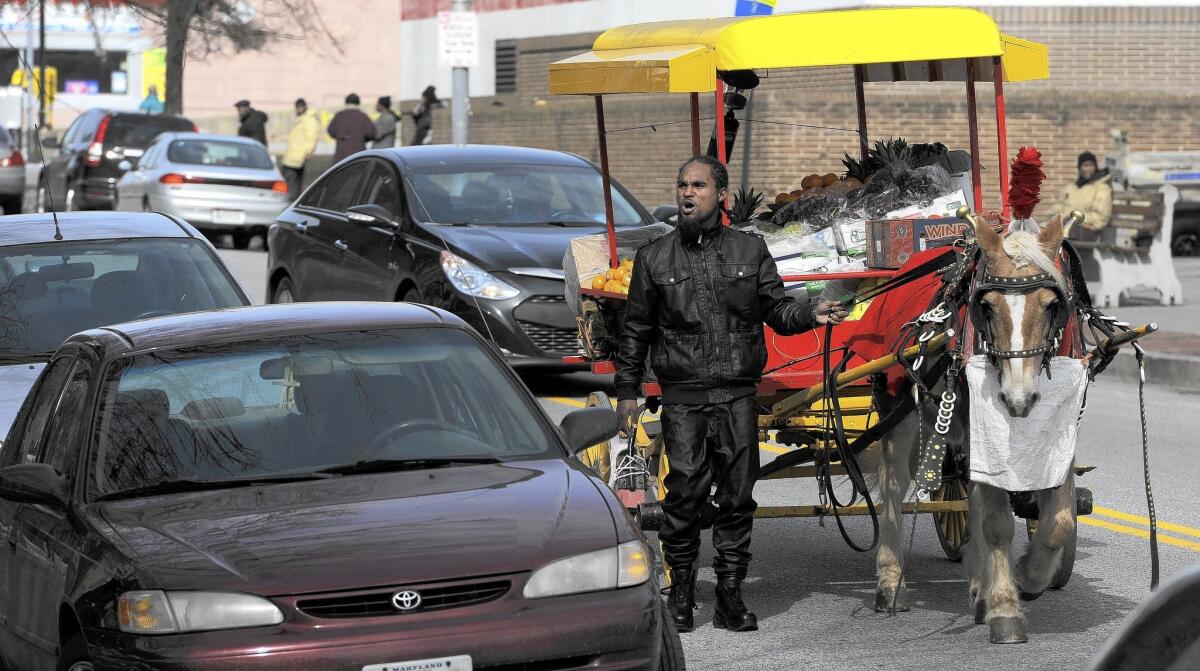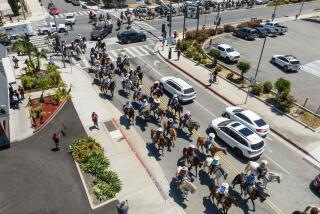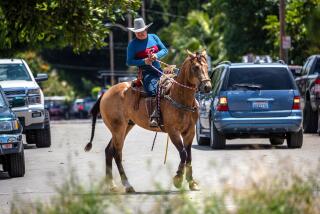A horse-drawn tradition endures, just barely

- Share via
They’re known as Arabbers and their profession as Arabbing — words that are supposed to evoke the nomadic life of a street merchant.
Arabbers sell fruit and vegetables from horse-drawn carts, much as the first Arabbers did when the profession took root in Baltimore after the Civil War as a way to provide blacks with work.
Once a thriving niche with more than 40 stables across the city, the trade has declined to just three stables.
The job of guiding a horse and a day’s worth of inventory through city streets has always been hazardous. And while discount supermarkets, complicated health regulations and prepackaged food have nearly wiped out the trade, the dozen or so Arabbers left find themselves dodging a growing number of cars.
Last year, as three Arabbers rode through south Baltimore on their cart, a Chevrolet Impala barreled toward them. The men jumped off just before the car slammed their wagon into a utility pole, spilling watermelons and cantaloupes across the sidewalk.
Tony, the palomino that had been pulling the cart, escaped with minor scratches. He was soon munching grass in a nearby median.
The produce vendors consider themselves lucky to have survived, but the incident was one of several crashes that have put Baltimore’s community of Arabbers on edge.
“So many cars on the road now,” said James “Fruit” Chase, who runs one of the last Arabber stables. “Horse going to show you what’s bothering him so you got to look ahead. If you know a big truck’s coming, you got to look out for it.”
Baltimore traffic officials say the number of cars in the city has rebounded to pre-recession levels. Light-rail extensions, new taxi services and a rising urban dirt bike culture are presenting new dangers for the Arabbers.
Snow and ice have forced them to park their carts and stable their horses for several days this winter — a different sort of occupational hazard. Chase bemoans the thousands of dollars the harsh winter has cost him. “Can’t do nothing,” he said.
A break in the weather in February allowed a few fruit men to venture out. Under a gray but warming sky, they loaded boxes of fresh strawberries, oranges and green beans onto their yellow and red carts. Cigar-chomping Anthony “Frog” Savoy carefully buckled Tony into his harness and hooked him to the cart.
The horse pawed at a patch of ice until he found sure footing, and Bilal “Yusuf” Abdullah took the reins.
Tony stepped tentatively through the melting snow that clogged streets and piled against curbs. The icy mounds narrowed roadways while the freezing and thawing created new potholes for the wooden wagon wheels.
“I don’t go over the snow,” said Abdullah, 25. “I just go around it.”
Abdullah keeps blinders on Tony to keep him from seeing the lines of cars. The horse’s ears twist in agitation at the hydraulic swoosh of a bus door opening.
“You just have to watch him,” Abdullah said. “Just rub him and talk to him. They don’t like that noise.”
Being a successful Arabber requires an expert’s feel for both the horse and the city streets, Charlie McLean said. He accompanies the cart as the crier, announcing the day’s fresh produce to passersby.
“You got to keep your mind on your surroundings,” said McLean, 55.
The horse is always first on their minds, McLean said. And among his primary concerns are the urban dirt-bike riders who come tearing down streets and popping wheelies.
“They don’t give our horses respect,” he said. “They don’t think a horse belongs here. We’ve been here hundreds of years.... They come by just to see if they can get a reaction out of the horse.”
Baltimore dirt bikers often ride in groups, taking up entire roadways while pulling dangerous stunts. Police and motorists see them as traffic hazards. But younger generations — including Abdullah — view them as young men who take part in an exciting hobby instead of crime or drugs. Abdullah says there is room on the streets for both cultures to coexist.
A dirt biker flew down the street by the stables.
“You gotta be careful — you got to be sharp — because you got these young people like these,” Chase said. “If you hear them coming up, get up to the horse and whisper.”
More to Read
Sign up for Essential California
The most important California stories and recommendations in your inbox every morning.
You may occasionally receive promotional content from the Los Angeles Times.












